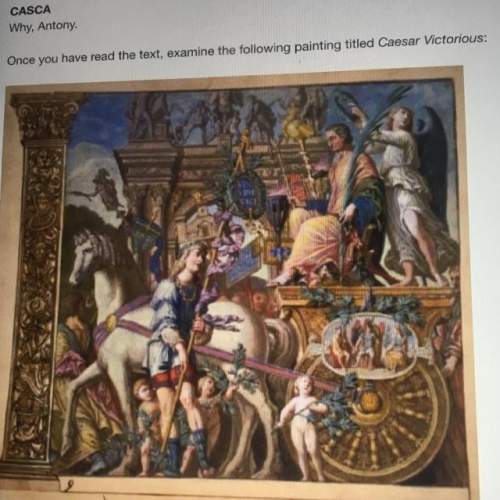
English, 29.06.2019 02:00 KindaSmartPersonn
What are some differences and similarities of this picture and this text? (both the picture and the text depict julius caesar's victorious return to rome.) here is the text: read the following from the play julius caesar: -casca: you pull'd me by the cloak; would you speak with me? -brutus: ay, casca; tell us what hath chanced to-day, that caesar looks so sad. -casca: why, you were with him, were you not? -brutus: i should not then ask casca what had chanced. -casca: why, there was a crown offered him: and being offered him, he put it by the back of his hand, thus; and then the people fell a-shouting. -brutus: what was the second noise for? -casca: why, for that too. -cassius: they shouted thrice: what was the last cry for? -casca: why, for that too. -brutus: was the crown offered him thrice? -casca: ay, marry, was't, and he put it by thrice, every time gentler than other, and at every putting-by mine honest neighbors shouted. -cassius: who offered him the crown? -casca: why, anthony.


Answers: 3


Another question on English

English, 21.06.2019 22:00
What can you predict about the rest of the story? a) it will be about an eighteen-year-old girl. b) it will be about the aubignys falling in love. c) it will be about armand aubigny's father taking him to paris. d) it will be about the relationship between arman aubigny and the girl. e) it will be about an economic revolution led by aubigny.
Answers: 2


English, 22.06.2019 08:40
Prompt: read the letter to the editor "i, too, have a dream." how does the writer use structure and language to persuade her readers and support her feelings about immigration? write an essay using evidence from the letter to answer the question.
Answers: 2

You know the right answer?
What are some differences and similarities of this picture and this text? (both the picture and the...
Questions

Mathematics, 30.03.2020 15:39



English, 30.03.2020 15:39

History, 30.03.2020 15:39

Mathematics, 30.03.2020 15:39





Mathematics, 30.03.2020 15:39





Mathematics, 30.03.2020 15:40






